
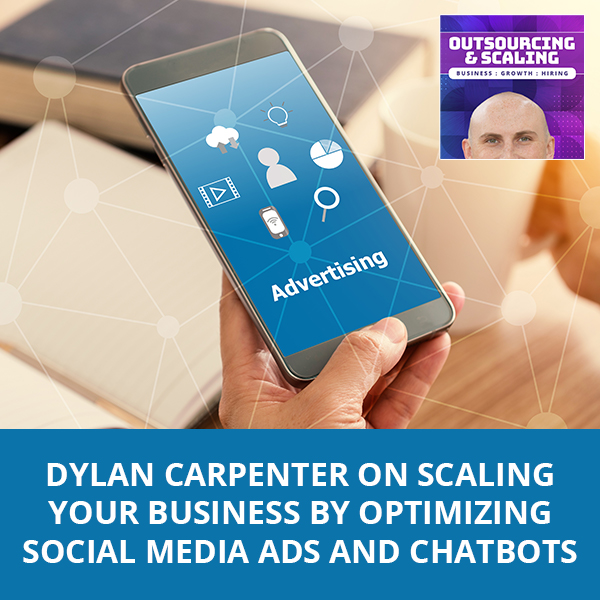
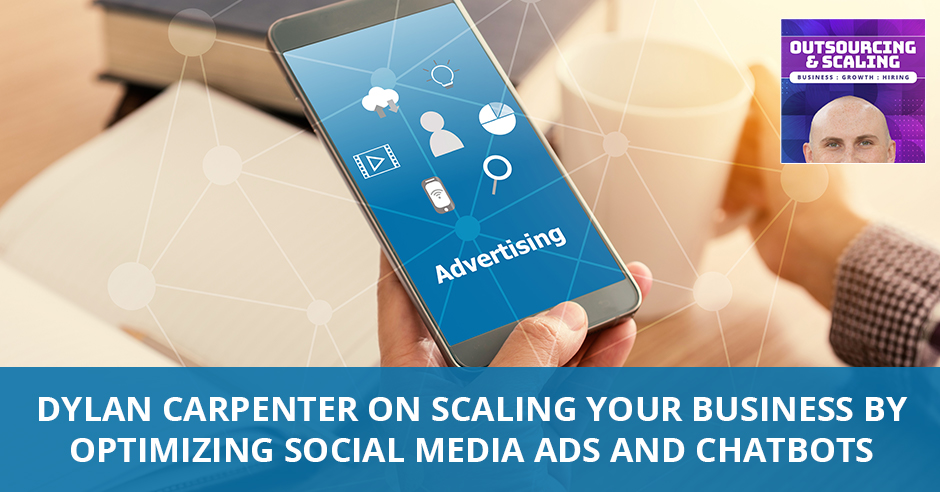
Social media, especially Facebook, has become one the best avenues for ads. Taking advantage of it for your marketing can take your products or company to higher levels. Marketing expert Dylan Carpenter, the Founder of Koality Media, shares is knowledge on everything related to social media ads such as chatbots, Instagram, and Facebook paid ads. Having worked for the biggest social media site in the world, he has developed his skills in understanding what is working and what is not to aspects like audience level and performance. He also talks about how chatbots can be capitalized for real estate sales and marketing campaigns. Learn more from Dylan as he shares how to optimize campaigns and use VAs and freelancers to help you in marketing.
—
Listen to the podcast here:
[smart_track_player url=”https://www.podetize.com/statsapi/www.podetize.com/wp-content/uploads/fileuploads/11-5b145ef137b51b3d1af0633e9305c43d/09/2019/d938e43e8a4c1a904c091afcace6d6f1.mp3″ title=”Dylan Carpenter on Scaling Your Business By Optimizing Social Media Ads And Chatbots” artist=”Nathan Hirsch” image=”https://freeup.net/wp-content/uploads/2019/04/OAS.png” ]
Download the audio file here.
Dylan Carpenter on Scaling Your Business By Optimizing Social Media Ads And Chatbots
I have a former Facebook contractor, Dylan Carpenter. How are you doing?
I’m good. How about you, Nathan?
I’m doing great. Dylan graduated from Texas State in 2017 and started a contract with Facebook immediately out of college as a marketing expert. After being on three different pilot teams, he took the leap of faith and started his own agency. It’s called Koality Media. He also runs a Facebook side of the white label agency. He does everything related to Facebook and Instagram paid ads and chatbots. We’re going to talk a lot about that, but let’s take a gigantic step back. Talk to me about what you were like growing up. I know you went to college, but were you a straight-A student? Were you a rebel? Did you always know you wanted to be an entrepreneur?
I was honestly a handful. I never thought I’d go into digital marketing. My dad’s in real estate, so he had a real entrepreneur drive which definitely rubbed off on me. My parents got divorced, so I looked for my dad which is a crazy story in general. With that, he was business-oriented, so I got a lot of my ethics and morals from him when it comes to how I operate a business. I was never a straight-A student. In college, I had a GPA of 2.2, so I wasn’t anything special at all. I’ve always done sales. I worked with LEGO. It was outside and inside sales for hardware and construction. When it comes to the digital marketing side of things, it didn’t hit me until my last year of college where I was helping our hockey team run a couple of ads here and there. It was nothing where I was at this point in time.
What was it like interviewing and applying to work with Facebook?
My brother works for Accenture, so I was outsourced at Facebook being here at Austin, Texas and everything. My brother is like, “Look up Accenture sales agent jobs.” I have been applying for one. I got a call and it was a contract for Facebook. I jumped on that and ended up having an interview three or four days later after an initial twenty-minute phone call. The interview was an hour. I was with a team lead who would be on this new project’s team. It went super well and got a job offer about 30 minutes after leaving the Facebook office and started there two weeks later. It was different and we started the marketing expo program here in Austin, Texas. I don’t think it’s around anymore, but when I was there, I was on three different pilot teams. Starting from the ground and building my way to the account management role, it was wild.
The more channels and sources you have to reach your audience, the better.
Were you working remote or were you working in the Facebook headquarters?
They had an office in the domain, which is a little bit more in North Austin, and we were on WeWork building. We had ad teams. There were probably around seven or eight different total Facebook teams in the WeWork building. Above us we had the HP that blows Amazon. They were building an actual Facebook building over there but by the time I left, I didn’t have the chance to work over there just yet. We were in the north domain office.
Did you meet any big names at Facebook? Obviously, Mark, but anyone else that people would know?
I met at a lot. Being involved with chatbots, I go to a lot of conferences so I got close to the main guy when it comes to Messenger marketing. I can’t think of his name right now, but he’s the head of the whole Facebook side of Messenger marketing. When it comes to ManyChat, we ended up asking him a ton of end up questions on, “Where’s the Messenger going? What do you think of ManyChat?” It’s all about the kind of communication and letting people have a good time on Facebook. As long as we follow the rules, it’s a cool user experience that they absolutely loved it.
Let’s dive in to marketing a little bit. Let’s talk about Facebook ads first. What’s working and what’s not working?
It’s changed a lot. It’s more of understanding the platform. Knowing where everything is, understanding how the algorithm works when it comes to manual bids testing because it changes pretty frequently. I did an article and my recommendations in there were, “I probably wouldn’t recommend that again.” It’s changing so often. One of those big things is campaign budget optimization. Understanding budgets at the audience level you grow up to campaign level. It’s where you let Facebook allocate the budget accordingly based on what’s performing the best.
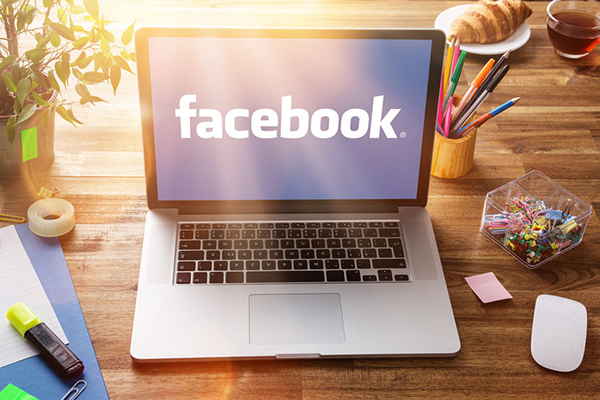
Since Facebook’s rolling that out 100%, I feel more and more people are using it, so it’s saturating a little bit where it’s not as good as it was in the past. We found ways to combat that and go back to the ad set budgets where it’s a lot more time consuming, but the algorithm knows what it’s doing. If you’re feeding them bad quality, it’s going to get you back on your results. It’s 100% data-oriented. If you’re a new business, you’re not going to dive in and get sales on the page. They focus on your ideal audience, and they connect people to your website so you can build off that and take those next steps essentially.
Do you get any glimpse into where Facebook ads are going?
They’re moving towards the group and event orientation. With Facebook, we’re the ones who make the money but the advertisers don’t care. It’s all about the user experience. What Facebook sees is that a lot of people are getting a lot more into events and groups aspect of Facebook. They’re going to be allocating more of their algorithm budgets. Essentially that boosts the group. They’re going to have paid groups now. You can put pixels in groups so you can build a look-alike of that and stuff. They’re moving to more of what people enjoy on Facebook the most, and that’s events and the group orientation side of things. Out of all my clients, I’m always like, “If you have a good B2C group, make a group, have frequently asked questions where people collaborate because those groups are going to be worth a lot.” If something happens to your page, you’re going to have a whole group you can come back with. It’s not going to be a one-hit wonder, the more channels and sources you do have, to reach your audience, the better. If you have a group, events going on, email list, Messenger list, the pixel, more areas the better. Of course, this is only Facebook. You have Google, LinkedIn, and I’m all over the place there.
We’re focusing on our groups outsourcing masters. Why is Facebook so much more into groups now than pages? I feel like back in the day it was, “How many likes can you get on your page?” Now, all the attention is going towards the groups.
It’s another way for Facebook to track engagement. When it comes to the page side of things, there’s no real way to engage with people on a one-to-one side. Of course, you’re going to reply to comments, but it’s not going to be that more conversation aspect. It’s more of that straight to business style. On the groups, if you have one person post it, you could have read 100 comments and people say, “You should try this.” What that’s pretty much doing is keeping people on Facebook more, which moves the individual, which gets people on Facebook more often. They’re going to go to specific areas to see those trends and make sure it’s continuing to evolve, along with its other platforms. Making sure people are having a good user experience while also boosting their rates because they got to share that with shareholders. They don’t want to show people they’re going down over time.
What about chatbots, what insights can you share there?
In the ads industry, you don’t need experience; you need more of work ethics.
When I started chatbots, I thought I was way ahead of the curve and I still feel like we are, but I don’t think we’re going to see their full potential for another year. We still see a lot of glitches. I like local business with it. With eCom it gets a little too extreme because the volume is excessive, which is one thing we outsource for. We do a lot of eCom raffles where we’ll be getting at least $0.20, and if a $10,000 budget, that’s going to be a lot of messages coming in. We’re probably going to hire four or five VA’s to go through that Messenger list and make sure no one’s wanting to speak to someone directly on top of the bot.
It’s a lot of maintenance and it changes fast. If you set up a flow, and Facebook’s API couldn’t read it right, and if they click on something that made you say something completely different, then a client sees that and is like, “What’s going on?” It can be one big glitch. I do volunteer for some pet shelters down here so we do a lot of donations. We’ll have brochures with a little scan code where you can scan with your Messenger. It’s a cool thing that you can do but they’re going to get rid of it. There’s no point when you can use an actual QR code, which you can use a referral link, which then ties it in the same thing.
They’re making it a little bit easier for consumers, but I would say on the chatbot side, I love it for qualifying leads. We do it for franchise leads, auto-repair, real estate. On the real estate side, you can find out how many bedrooms they want, their price range, what ZIP code they’re looking for, when are they looking to move. Of course, it’s cool to have a lead form and take them to the sites to do that, but it’s a more of a personal approach when it comes to chatbots because they’re talking to a real person.
Are you paying per message or per bulk message?
It’s the opt-in message essentially, so what I like to do is get a lead magnet. I built this for a legal client, it’s child neglect. It says, “These are the first three things if you have any questions,” a child neglect policy or something when it comes to the legal side. They click Learn More, it opens a Messenger, they opt-in, they get that lead magnet. Those lead magnets maybe cost $1.25, and that’s for a legal lead. If we get 100 of those, those retainers are $3,000 to $5,000. It’s a cool way to get into the system and even if they don’t convert out of the gate, we’re building that Messenger list where these leads are $1.50 just to get a PDF and quartz. I can set up a jerk campaign within Messenger and tag users, have a safe little raffle, do fun things to keep them engaged. With the chatbot side, the cool thing about it was the broadcast where people can opt-in. If I got $1, I could send them a message for free whenever I want, as long as it wasn’t promotional. Facebook said they’ll be getting rid of that. They’re moving toward that pay to play model which makes sense. It is what it is. You’ve got to adapt to the punches there.
What about using Instagram and combining it with the overall marketing strategy? What type of businesses should be spending more time on Instagram, Facebook, ManyChat and how do they go all together?
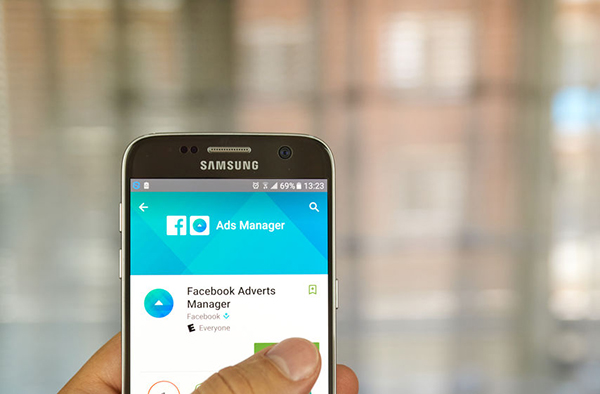
I see ManyChat work better on Facebook. We always test the platform side by side and see what performs the best. I would say 95% of the time, we end up rolling 80% of the budget on the Facebook side because that’s where the lowest CPL is. On the Instagram side, it completely depends on the product, what the offer is, and what kind of following you have. We have a lot of fitness influencers and they kill it on Instagram. It depends on how much data is in there and what kind of creative content they have. With Facebook, we get eight lines of text with a catchy image. On Instagram, people are going to start image first and we only have two or three lines of copy.
We specifically segment Instagram versus Facebook independently. We let them take their own path because they’re going to perform completely different. I would even say that when it comes to traffic funnel leads coming out of the gate, we always see cheaper conversions from Facebook. Even for our big Instagram influencers, we always test to see where the money is. If we have a free eBook for how to lose six inches in your waist in six months kind of thing, we can get leads for $1.50 on Facebook, but on Instagram maybe $1.75. When it comes to a $10,000 a month budget, that little extra bit, I’d rather put that into Facebook. It depends. We’ve had numerous where Instagram performs better.
It’s one of those cases that you have to test because it’s not going to be a one-hit wonder. Luckily there’s a tool called automatic placements where they see ads where people are most likely to convert. With that, I’d be careful with audience network because it’s within apps, it’s when people go to websites so the quality of traffic is a lot crappier. The click-through rates cost per clicks that we’ve found is that an audience is bad at converting unless you work with people 50 plus, which is a little bit different. It’s all about assessing there.
What else did I miss? Tell me more about marketing before we talk more about VA’s and hiring. I know you use a lot of remote talent as well.
On the Facebook side, when it comes to understanding what’s going on, I usually recommend a test. That’s the biggest thing. I have so many accounts where people think they can build one ad and test one audience then they’re going to scale to the moon. Whenever we launch new accounts, I usually recommend probably three to four campaigns. Each campaign will have ten to twelve audiences, depending on what our budget is and within each audience, we’ll have four to six ads. We could ultimately start with 40 to 50 audiences worth 300 ads.
What that does is with these different ads, Facebook places them in different pockets because some do better than others or vice versa the next day. You give yourself a little bit more leeway, and it’s one of those concepts, “Why throw one dart to get a bullseye when you can throw twenty?” Luckily there are a lot of automated roles to make sure no CPLs go crazy or Facebook doesn’t pull out your budget. Nothing is wrong about lying to have a little safety net because it’s changing a lot more. It’s where you have to throw stuff at the wall and hope it sticks. It’s a terrible way to say it but with Facebook, one thing to keep in mind is you can’t fall in love with campaigns. On some accounts, we have campaigns running for six months and they kill it. Of course, one day they crap the bed and you can’t do much after that. You have to continue testing new things because nothing lasts forever.
Talk to me about hiring. What are you as an agency owner using virtual assistants and freelancers for?
On the VA side of things, we usually have them more on the actual Messenger. Because on these raffles, it’s such a good offer so we’re getting leads. It’s cost-effective so we have some little businesses getting 500, 600 messages per day and they’re no way near prepped for that. On the VA side, it’s more on monitoring the Messenger side building out. Actual dashboards, reporting side of things where I build up all the ads, I give them the integrations they need to where they just structure the customer reports for me. They don’t do anything client facing, they relay it all through me on the VA side. On the VAs, they’re a little bit more in the dark where they have specific tasks done. What I think is $8, $10 per hour so I usually segment my little task on, “What is it worth to me?” I have some things worth $5 to me and some worth $10. They fluctuate there.
Grab so much value as you possibly can without giving away the keys to the farm.
On the full-time side of things, that’s where I saw my biggest issues. I wanted to bring somebody on, train them from scratch because in Facebook, I had no idea what I wanted to do. I just got on the trenches and went my way up there. I felt the same way but it was scaling too fast to where I need somebody who had experience with Facebook ads and media platform. You had to scale a little bit and you had to optimize. That’s what’s working the best for me right now. I probably might be hiring two more guys. One of them will have experience in Facebook. The other I’m going to bring him in from scratch and shadow me for two or three months to learn how to scale, what I’m looking at, what stats to keep an eye on, what raises red flags.
In this industry, you don’t need experience. I would definitely say it’s more of having the work ethic. I’d rather have somebody who wants to start their own business work for me, rather than someone who just wants to idle by. I know somebody who wants to be an entrepreneur, I can have them segment their own side of the business like, “You have a lot of wiggle room here, focus on this end. The fruit will be there. You’re growing with me.” To where they’re pretty much to on their entrepreneur side and my business essentially.
It’s intense, and especially with how much Facebook changes, it’s hard to give up those simple freedom because you’re scared to screw up an account when you’re spending other people’s money. I definitely put a lot on some guys. I used to work with them at Facebook and he was still at Facebook when I hired him. I was like, “Are you looking for a new gig? How’s Facebook treating you?” He’s like, “It’s cool.” I was like, “Do you want to work remote and have a lot of freedom?” He absolutely loves it. Luckily it was the perfect time for that. I would say I’d probably be going to a lot of college campuses teaching courses on chatbots and the basic fundamentals of Facebook ads. I’m going to be using that as a recruiting tool and build a little empire.
There’s a lot that comes into it when it comes to onboarding accounts, the sales side of things, setting up initial campaigns, audiences, optimizing building their creatives. There are a lot of areas that I can capitalize on. I enjoy scaling, I don’t like building up the ads or the campaigns. I know how to read the numbers and optimize. For me I’ll be outsourcing my actual ad creation, audience selection and creations, where I tell them, “Here’s a strategy, here’s a game plan. Go ahead and implement it.” I definitely see the strategy, the vision and I have everybody else do the implementation side of things.
Are you using mostly lower-level VA’s or are you using higher-level freelancers and white label partners as well?
On the VA side of things, I have one here in Austin and she makes $10 an hour. I have one in the Philippines at $4 an hour. I’m probably going to move more to the local side because I like going face to face with people. I’m a sales guy at heart. Before I took a job at Facebook, I almost moved to Orlando to be a custom suit tailor. I’m a face to face guy when it comes to training. I train people excessively faster if they come over here two or three times a week. It’s like, “Here’s what we’re going to be doing, here’s where the learning point is.” I always do everything a little excessive to where I write everything out, “Here are the actionable titles you’re going to be learning. Here are request scenarios you can have.” I get down and dirty because it happened to me at Facebook and it was stressful. I know this is a stressful platform because I’ve heard so many glitches. It’s a lot harder to train somebody on those newer things.
What else did we miss about marketing and using social media?
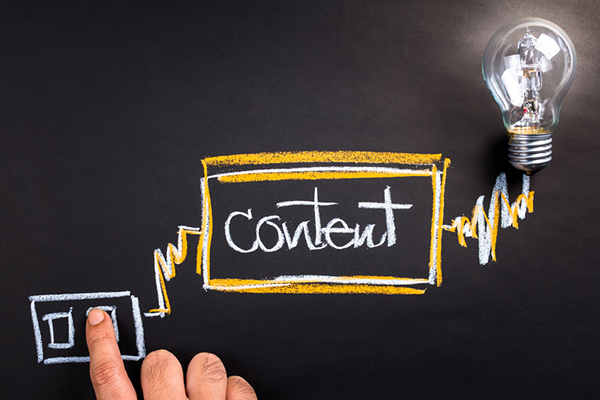
If you have a product I would more or less say focus on your emails. Emails are everything. People botch on them all the time. If you have a product over $50, if you’re getting hit by their ad or they’re getting hit by your ad, I guarantee they’re getting hit by eight, ten other email accounts with similar ads. What’s going to differentiate you to where, I love the content marketing approach like, “Get this free eBook. Three things to know.” To where, “When are we going to be doing direct response out of the gate?” We get into the blogposts, the Messenger bots, get their email, they get some value and nobody follows up with them that way. We found that work is substantially better than growing an audience, losing the lifetime value. The average overall value does suffer in the beginning simply because you have to have lower barrier entry offers. Of course, with the amount of volume you’re bringing in, it’ going to be a way that your return of LTB in the big picture.
One big thing with marketing, take the content marketing approach with Facebook. It’s not really learning on how to scale. It’s more of finding content these days like how are your videos, you’ve got blogs. Before a lot of people start it’s not going to be a one-hit wonder. Have videos, have blog articles, lead magnets. The more content they have the better. I’ll test one or five offers at one time because one is not going to be that one fix. With Facebook, you have to test. Luckily you can do it within three days. The more value the merrier. Grab so much value as you possibly can without giving away the keys to the farm.
Dylan, thank you so much for joining us. Where can people find out more about you, and what are you most excited about?
You all can go ahead and find me at KoalityMedia.co. I have a Facebook page as well. I have a lot of cool videos on Facebook ads retargeting fun little basic stuff, intermediate and advance. I’m trying to upgrade it more. What I’m most looking forward to is, I’m the head of the Facebook side or Paid Social for this white label agency for Oxbird. We have a bunch of Google accounts. They start of primarily with Google and I’m doing all the Facebook side. We have over 25 agency partners and probably over 100 accounts in there. We’re growing as a white label agency to a whole new level. We’re fixing to offer white label LinkedIn Services, which I’ve never seen. We’re trying to take the market by storm, but quality media is going well. On this white label Oxbird side of things, it’s a whole new level. I love dealing with direct clients, but working with agencies is more fun because I can see the big picture side of things. It’s fun making a lot of clients money where they don’t even know I exist. I just work with the agency. There’s something about that that pumps me up a little bit. White label thing for me is the biggest because we have a lot of large agencies at the door so I would imagine we’re going to have some big doors opening up. It’s getting better and better. It’s a wild ride right now.
Thank you so much for coming on and joining us. I’m sure we’ll be in touch.
Thanks for having me and have a great rest of your day.
You, too.
Important Links:
- Koality Media
- ManyChat
- KoalityMedia.co
- Facebook – Koality Media
- Oxbird
About Dylan Carpenter
 Dylan Carpenter Graduated from Texas State May of 2017 and started a contract with FB immediately out of college as a Marketing Expert. After being on 3 different Pilot teams, he took the leap of faith and started his own agency Koality Media. He also run the Facebook side of a White Label Agency. They do everything related to FB/IG paid ads and chatbots!
Dylan Carpenter Graduated from Texas State May of 2017 and started a contract with FB immediately out of college as a Marketing Expert. After being on 3 different Pilot teams, he took the leap of faith and started his own agency Koality Media. He also run the Facebook side of a White Label Agency. They do everything related to FB/IG paid ads and chatbots!
